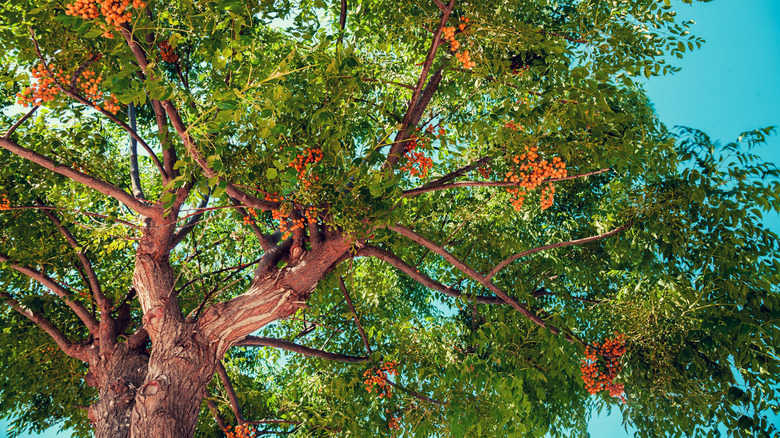Planting A Carrotwood Tree In This Sunny State May Cost You. Here's Why
Carrotwood trees, scientifically known as Cupaniopsis anacardioides, have stirred quite a controversy in the world of horticulture and conservation, particularly in the beautiful Sunshine State of Florida and heavenly Hawaii. These states have taken the lead in heavily regulating and even prohibiting the planting of carrotwood trees. But why? Carrotwood trees are considered an invasive plant species in the United States and in other countries. They've earned this reputation due to their aggressive growth and ability to outcompete native flora.
In Florida, the Exotic Plant Pest Council classifies the carrotwood tree as a Category I invasive species, meaning it poses a significant threat to the state's ecosystems. Way back in 1999, the Florida Department of Agriculture and Consumer Services included carrotwood in a list called the Florida Noxious Weed List (5b-57.007 FAC), which names plants that "may not be introduced, possessed, moved, or released without a permit." In Hawaii and other coastal areas where carrotwood thrives, the situation is no different; the tree's invasive nature has led to restrictions and discouragement of its cultivation. As a result of these strict regulations, planting carrotwood trees can incur hefty fines and even legal action due to the profound negative impact they have on local biodiversity.
Invasive characteristics of the carrotwood tree
The carrotwood tree is a unique species that hails from Indonesia, Papua New Guinea, and Australia. Its appeal is understandable, as it boasts lush evergreen foliage, attractive yellow or orange fruits that turn sweet when ripened, and a canopy that provides ample shade. As a result, many homeowners have been lured by the tree's aesthetic qualities.
However, these seemingly charming attributes come at a price. Carrotwood trees are notorious for their invasive tendencies, which is why they're considered a weed in Florida. They can quickly overtake native vegetation, monopolizing resources and outcompeting local plants. Their dense foliage creates an environment where sunlight and nutrients become scarce for other plants, ultimately undermining the delicate balance of the ecosystem. These trees produce a multitude of seeds that are dispersed by birds and other wildlife, further facilitating their spread. And since carrotwood trees are salt-tolerant, they pose a serious threat to mangrove swamps and other coastal ecosystems where they thrive.
Alternative landscaping choices
Now that we understand the reasons behind the strict regulation and prohibition of carrotwood trees in places like Florida and Hawaii, let's talk about what we can do to prevent them from taking over. The most straightforward solution is not to introduce carrotwood to your landscape in the first place. Opt for native or non-invasive species when planning your garden. If you already have carrotwood trees in your yard, consider their removal. Consult a professional tree removal service to ensure it's done correctly, as simply cutting them down might not eliminate the problem.
If you live in an area where carrotwood is still allowed, maintain a close watch on your trees. Regular tree pruning and seed removal can help curb their spread. As for alternatives to carrotwood, numerous native and non-invasive species can provide shade, aesthetic appeal, and wildlife benefits without the destructive tendencies. For example, the University of Florida suggests planting species that are suitable to local weather conditions like sand live oak, Southern magnolia, sabal palm, and bald cypress, all of which can resist hurricanes. In Hawaii, endemic koa and hala trees are excellent choices that can flourish without endangering local ecosystems.
So, while the carrotwood tree may seem attractive, its invasive nature makes it a threat to Florida, Hawaii, and other landscapes it has invaded. By understanding the risks and adopting alternative landscaping practices, we can help preserve our unique ecosystems while still enjoying the beauty of our yards and gardens.


